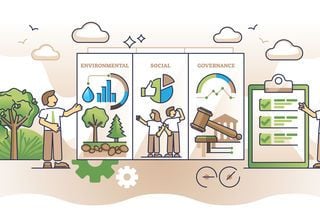Learning by doing: the short term future of S for longer term preferable futures
How to incorporate the S in ESG reporting: materiality, metrics and creating momentum
Sustainability in Hospitality — Viewpoint by Anke Winchenbach
I would like to contribute to this HospitalityNet from the viewpoint of my independent consulting experience. Here, from 2021 through 2023, I had the opportunity to work with an Italian smart city affordable housing scale up, connecting their Community Development business unit to the Real Estate line of the business. It is part of their USP to offer Community Development services in the new settlements they build in Brazil and -in a joint venture- in India, and they deliver consulting services in community management in European Union countries, like Italy. In the last two years, the enterprise has matured the awareness that a specific ESG Department represented a new business opportunity, whereby their experience in environmental and social sustainability might be transferred through consulting services to the wider market. Their ESG capability is integrated in the newly formed Digital and Advisory department, based on their Italian state-of-the-art competence centre. In conclusion, such company, labeled as a potential Italian unicorn, might offer combined lessons
Having reported on my direct experience, I would like to share a few reflections, which I matured during my further elaborations from consulting experience to research reporting to potential peer reviewed publications:
1) currently, there is an increasing demand from financing bodies and institutions to have ESG compliance certified, whereas there might be a poor offer side of qualified consulting services designed to supply the necessary support;
2) in particular, the S parameter seems indeed less consistently defined and identified than the environmental (E) and the governance (G) parameters, which are being measured on the basis of existing references, e.g. the S&P Sustainability Index;
3) for the purpose of establishing a clear and shared framework of reference to define the S parameter of ESG, the United Nations Strategic Development Goals might be a first reference, whereby each sector and industry might identify appropriate references to build their own ad hoc metrics;
4) scientific literature and relevant bibliography offer all the necessary sources to build any sector specific concept, which will serve as prototype and testing ground to validate the metrics framework;
5) scientific literature and publishing are also a necessity for the S parameter to be further developed, hence best practices might prove beneficial to the larger context for scoping the field by thought leadership and dissemination.
At the moment, there seems to be a high degree of demand from mission-critical entities (banks, investment funds, venture capitalists) putting pressure on those entities in need of funding (startups, scaleups, shareholding based corporations), hence the opportunity will be there, to translate such funding and banking demands into a truly intellectually sustainable platform, possibly enabling a deeper transition towards preferable futures. Learning from practice and transferring such learnings into standards by means of valorization, publication and dissemination will be key.

 by
by 

